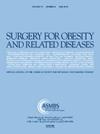Comparative survival of sleeve gastrectomy versus Roux-en-Y gastric bypass in adults with obesity: a systematic review and meta-analysis
IF 3.5
3区 医学
Q1 SURGERY
引用次数: 0
Abstract
Background
The difference in survival between sleeve gastrectomy (SG) and Roux-en-Y gastric bypass (RYGB) remains controversial.
Objective
To investigate the comparative survival difference between SG and RYGB in adults with morbid obesity.
Setting
A meta-analysis.
Methods
MEDLINE, EMBASE, and Cochrane Library Central Register of Controlled Trial were searched through June 30th, 2023 to identify studies comparing SG and RYGB. To minimize confounding, only adjusted outcomes were used from observational studies. The primary outcome was all-cause mortality during follow-up. Secondary outcomes were revision, reoperation, reintervention, hospitalization, endoscopic procedure, and emergency department visit.
Results
Twenty-two studies (10 randomized controlled trials [RCTs] and 12 observational studies) met the inclusion criteria. Three RCTs and seven observational studies with 333,713 patients (SG, n = 172,909; RYGB, n = 160,804) were analyzed for all-cause mortality, with a weighted median follow-up of 34.4 months. SG was associated with decreased risks of all-cause mortality during follow-up (hazard ratio [HR]: .85; 95% confidence interval [CI]: .79 to .92), reoperation (HR: .69; 95% CI: .59 to .80), reintervention (HR: .74; 95% CI: .66 to .81), hospitalization (HR: .86; 95% CI: .77 to .97), and endoscopic procedure (HR: .55; 95% CI: 0.40-.76), whereas SG was associated with a higher risk of revision (HR: 2.18, 95% CI: 1.52 to 3.14). Meta-regression suggested consistent survival advantages of SG regardless of the proportion of patients with diabetes or follow-up duration.
Conclusion
In adults with morbid obesity undergoing bariatric surgery, SG was associated with a decreased risk of all-cause mortality during follow-up compared with RYGB. A large-scale randomized trial with long-term follow-up is still necessary for validation.
成人肥胖患者袖式胃切除术与Roux-en-Y胃旁路术的生存率比较:一项系统回顾和荟萃分析。
背景:袖式胃切除术(SG)和Roux-en-Y胃旁路术(RYGB)的生存差异仍然存在争议。目的:探讨SG和RYGB在成人病态肥胖患者的生存比较差异。背景:荟萃分析。方法:截至2023年6月30日,检索MEDLINE、EMBASE和Cochrane图书馆中央对照试验登记册,以确定比较SG和RYGB的研究。为了尽量减少混淆,仅使用观察性研究的校正结果。主要结局为随访期间的全因死亡率。次要结果为翻修、再手术、再干预、住院、内窥镜手术和急诊就诊。结果:22项研究(10项随机对照试验[rct]和12项观察性研究)符合纳入标准。3项随机对照试验和7项观察性研究共333,713例患者(SG, n = 172,909;RYGB (n = 160804)的全因死亡率分析,加权中位随访时间为34.4个月。SG与随访期间全因死亡风险降低相关(风险比[HR]: 0.85;95%可信区间[CI]: 0.79 ~ 0.92),再手术(HR: 0.69;95% CI: 0.59 ~ 0.80),再干预(HR: 0.74;95% CI: 0.66 ~ 0.81),住院(HR: 0.86;95% CI: 0.77 ~ 0.97),内窥镜手术(HR: 0.55;95% CI: 0.40- 0.76),而SG与更高的修订风险相关(HR: 2.18, 95% CI: 1.52 - 3.14)。meta回归显示,无论糖尿病患者比例或随访时间如何,SG的生存优势都是一致的。结论:在接受减肥手术的成人病态肥胖患者中,与RYGB相比,SG与随访期间全因死亡率风险降低相关。仍需要长期随访的大规模随机试验来验证。
本文章由计算机程序翻译,如有差异,请以英文原文为准。
求助全文
约1分钟内获得全文
求助全文
来源期刊
CiteScore
6.70
自引率
12.90%
发文量
570
审稿时长
56 days
期刊介绍:
Surgery for Obesity and Related Diseases (SOARD), The Official Journal of the American Society for Metabolic and Bariatric Surgery (ASMBS) and the Brazilian Society for Bariatric Surgery, is an international journal devoted to the publication of peer-reviewed manuscripts of the highest quality with objective data regarding techniques for the treatment of severe obesity. Articles document the effects of surgically induced weight loss on obesity physiological, psychiatric and social co-morbidities.

 求助内容:
求助内容: 应助结果提醒方式:
应助结果提醒方式:


